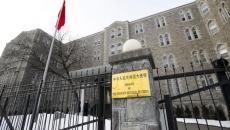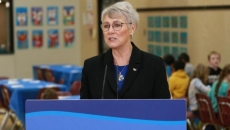Legislation in the United States that could trigger an end to seasonal time changes in Canada is moving forward again, as Canadians get ready to wind their clocks ahead an hour before going to bed Saturday night.
Daylight time, which sees people enjoy an extra hour of daylight at the end of the day starting March 12, ends on Sunday. Daylight saving time (DST), is the practice of fowarding clocks by 1 hour during warmer months so that darkness falls at a later clock time. The standard function of DST is to set clocks forward by one hour in the spring and thus the phrase spring forward, and to set clocks back by one hour in the Fall thus the phrase fall back to return to original clock time.
Provinces have been promising for years to ditch the time change but have cited a need for consistency with U.S. states for the delays.
Now a U.S. bill to authorize the change that has been repeatedly thwarted is back in play.
Last week, U.S. Senator Marco Rubio reintroduced the Sunshine Protection Act, which would allow daylight time to be made permanent.
Rubio said in a statement that the "ritual of changing time twice a year is stupid," and that ending the practice has bipartisan support.
British Columbia Premier David Eby said Wednesday that the province's position of wanting to remain "in-sync" with west coast American states hasn't changed, but he is "very much looking forward to getting rid of daylight-saving time."
The U.S. bill, first proposed in 2018, has repeatedly failed to get through both houses of Congress. Last March, it was approved by the Senate but stalled in the House without a vote.
If the federal bill gets through, that would allow U.S. states to enact their own changes, including those cited by Canadian provinces. More than a dozen U.S. states have passed legislation that is waiting on the federal go-ahead.
In B.C., legislation was passed four years ago to allow the province to permanently stay on daylight time.
But then-premier John Horgan said the change would depend on Washington, Oregon and California doing the same. In Ontario, Premier Doug Ford has said a switch would require New York state to also ditch the time change, while Quebec Premier François Legault has said he is open to making daylight time permanent.
Eby echoed Horgan's position, saying B.C.'s close integration with U.S. states gives rise to legitimate business concerns if the province moves to a different time zone, and the need to stay aligned is the "sole reason" changes have not already been made.
"I think all of us would be delighted to see the back end of daylight-saving time," he said. "But at the same time, we want to make sure we are aligned with major trading partners' efforts."
University of British Columbia business professor Werner Antweiler said the latest version of Rubio's bill has bipartisan support and stands a much better chance of moving through the U.S. House as well as the Senate.
If that happens, a domino effect could ensue, and B.C.'s time change at 2 a.m. Sunday morning may be its last, he said.
"It looks as if the Senate is going to re-approve the bill, and the House will take it up for a vote this time around," said Antweiler, who has followed the issue closely as a researcher. "Chances are that we are not moving back to standard time in the fall."
Most provinces as well as the territories of Nunavut and the Northwest Territories will move their clocks ahead one hour early Sunday.
Yukon and most of Saskatchewan keep their clocks the same year-round. Yukon made the switch for the last time in March 2020, and standard time is now permanent.
Government officials said in 2021 the change was a relatively smooth process.
In nearby Atlin, B.C., an unincorporated community where under 500 people live just south of the Yukon border, residents have decided to join the territory rather than change their clocks with the rest of the province.
"It's been great. It's actually best for us in some ways," said Sandryne Berger, who co-owns the Mountain Shack Cafe. "At first it was dark in the morning but still light when we finish work."
Sean Boots moved to Whitehorse with his wife in October 2019 and welcomed Yukon abandoning the time change, having grown up in Saskatchewan.
"I've always thought that the daylight-saving time changes that happen in the rest of Canada were a bit of a silly idea," he said.
"I remember the first time I experienced a daylight-saving time change was when I was in Ontario for grad school and I was just like, 'What is this? This is bananas.'"






